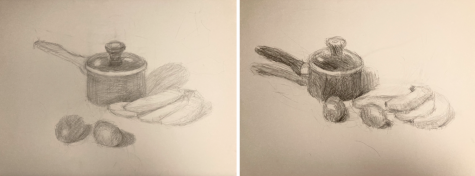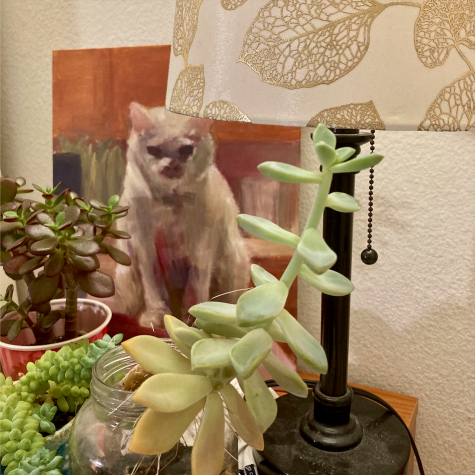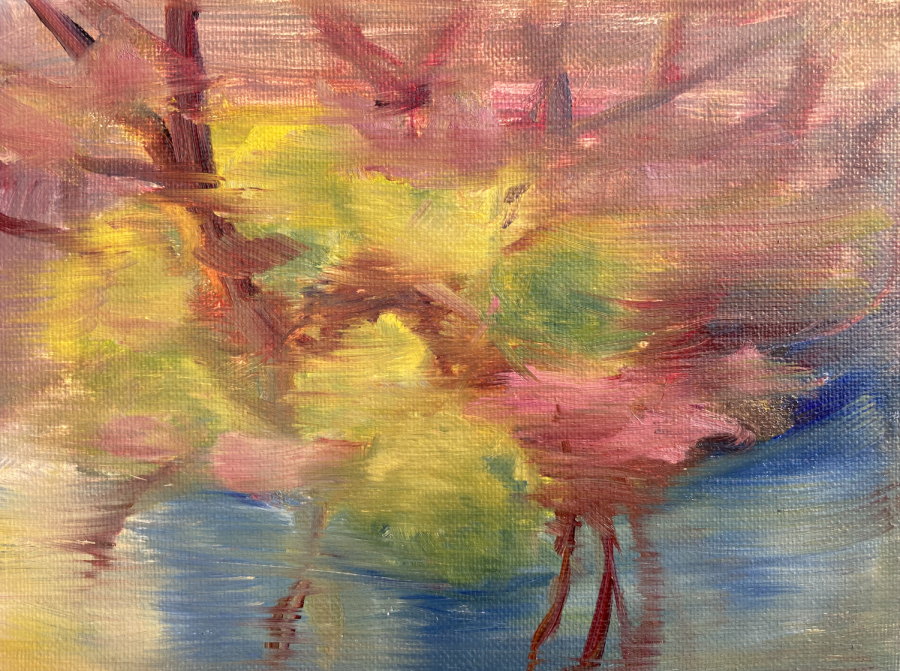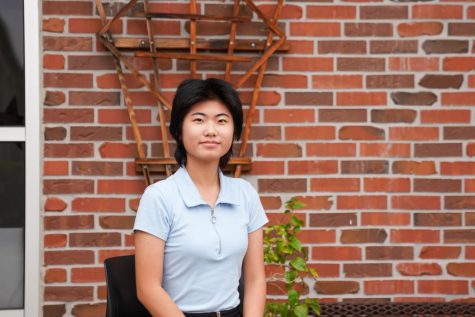Life imitates art
Analyzing how my relationship with art has affected my self-esteem
A small painting I did would not turn out right no matter what I tried, so I simply blurred it with a large brush and accepted it as it was.
October 28, 2021
My stomach sank as I watched my sketching teacher praise my brother’s drawing. I was eight at the time, in my fourth year of learning art, and my younger brother had just started his first class.
Talk about me, talk about me, I thought desperately, as if the instructor could hear the thoughts racing in my brain.
Eight years removed from this scene, I don’t remember what he said about my sketch. I just remember thinking how I was losing my value as he praised my brother’s pencil strokes.
I felt worthless as a child. My brother was better than me at sports, piano and math.
But art was my thing. Art was what I was good at.
When my parents first dropped me off at a toddler art class at 5 years old, I sat in the corner of my table, focused, as I colored in drawings of Hello Kitty and Pokémon. I didn’t have to look at what others were doing. I could just work alone — without comparisons — and I loved it.
I was filled with pride when teachers praised me for being so focused and good at art. After hearing so many people compliment my brother daily, I had found a place where only I could be applauded. For once, I was the impressive one. Or so I had thought.
It felt to me that my brother’s drawing was praised more highly than mine — his lines were strong and bold, while mine were soft and vague. And throughout the rest of the classes we attended together, my internal dialogue continued to degrade myself.

What is my thing? What am I good at?
I continued drawing, but now with the fear that I wasn’t talented like my brother was. I kept practicing, hoping that others would tell me how special my drawings were.
It was a toxic relationship — I longed so badly to feel validated, to feel special, but it would never happen the way I wanted to. I wasn’t being held back by my skills, but rather, by my mindset. How can you feel truly happy if you only derive joy from the affirmations of others?
Two years ago, I started a new art class. The teacher scared me at first — he was a professional artist and he spoke of concepts I could not grasp. But that fear soon dissipated. He asked us for songs to listen to during class, told stories about his auditions for a K-pop company and showed us photos of when he was a teenager with a Justin Bieber haircut. Most notably, he encouraged me to apply for an art camp called Palette Project.
I was terrified of applying. The camp was an oil painting workshop intended for students ages 17-22, and I was 15 and had never tried oil painting before. Plus, the camp took place at an established art school in Arizona. But with my heart pounding in my chest, I submitted the application, and by some miracle, an acceptance email came back four days later.
Through the camp, I fell in love with oil painting in the same way 5-year-old me had fallen for coloring. It was exhilarating to learn what I could create with a brush. But more importantly, I loved the way it made me feel.
My first few paintings were nowhere near the standards I set for myself, but I still loved them. I loved mixing colors, I loved stroking my new brushes against the panel and I loved how painting forced me to slow down and ground myself.

I painted things that looked bad, and I painted things I wanted to show off. I painted with my fingers. I painted to calm down, to relieve stress, to capture something that I thought was pretty to keep for later. I painted what I wanted to paint.
I placed my subpar paintings all over my room, and I felt joy from them. I looked at my messy paint strokes and thought back to how proud I felt when I swiped them on the panel and my heart swelled. And by focusing on my feelings when creating art, the words of others began to carry less weight.
Painting makes me happy, so it’s my thing. So what if I’m not an artistic genius? So what if my art doesn’t look like the paintings I spend hours staring at in museums? Art doesn’t need to be perfect, and painting shouldn’t cause stress.
When my teacher recommended that I join his oil painting class with two other students, I happily agreed.
At the end of the first day, he remarked, “We don’t have many people in this class. I don’t tell everyone about it.”
“So I’m special,” I joked.
“Yeah,” he said absentmindedly, glancing at his painting. “You are.”
Yeah. I am.


















